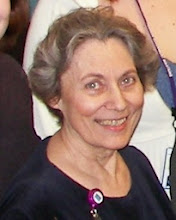The following comes from a posting by artist Robert Genn, April 19, 2005, and his perceptions
about the creative process in art. His
ideas apply to an equally creative process in writing, including journaling. It’s a way to release fresh creative thoughts
and approaches. After all, composition
in the visual arts is equally important in the language arts. So when Robert Genn talks about painting, the
journalist can think writing, and start to follow an interesting new side paths
in our daily entries.
“Not everyone knows what I'm talking about when I drag the
word "homeomorphic" out in mixed company. Specifically to do with equality of shapes in differing chemicals, it's not in the art books [nor the writer’s books]. But it's a valuable creative concept.
Without always knowing its name, homeomorphism is generally pointed out
as a type of compositional problem.
Typically it's a lineup of equidistant trees, or a mountain
that rises up conveniently in order to avoid colliding with a foreground element [or a grocery list of what you did today]. It's a natural
tendency of the human mind to automatically organize things neatly and in a
regular manner. You can probably see an example of architectural homeomorphism from
where you sit--window panes are generally divided from one another by
equidistant mullions….
Many artists [or writers] instinctively fight it. Too much homeomorphism, unimaginatively used, gives a "ruler-regularity" that tends to make work boring. Nature's not like that. Nature tends to be uneven, random, even chaotic. This means big against small, recession against protrusion, foreground against background, dark against light, warm against cool.
There's a parallel in music [or poetry]. Music often depends on a regular and reliable rhythmic beat. But in a lot of jazz, reggae and stride piano [free verse] for example, the beat is given on the off-note. Rather than conformation, there's counterpoint. While providing a safe haven, homeomorphism tends to snuff natural dynamism and neutralize creative surprise.
But homeomorphism is also a valuable design device. It can add interest, mystery, magic and strength. Lineups, repetition, transfers, rhythm and spottification [bits & pieces?] are some of the tools of abstraction. Free from nature's reality, the creative eye can decide to "hold" a shape with another, or "confuse" by allowing a shape or a line to be drawn to another.
Many artists [or writers] instinctively fight it. Too much homeomorphism, unimaginatively used, gives a "ruler-regularity" that tends to make work boring. Nature's not like that. Nature tends to be uneven, random, even chaotic. This means big against small, recession against protrusion, foreground against background, dark against light, warm against cool.
There's a parallel in music [or poetry]. Music often depends on a regular and reliable rhythmic beat. But in a lot of jazz, reggae and stride piano [free verse] for example, the beat is given on the off-note. Rather than conformation, there's counterpoint. While providing a safe haven, homeomorphism tends to snuff natural dynamism and neutralize creative surprise.
But homeomorphism is also a valuable design device. It can add interest, mystery, magic and strength. Lineups, repetition, transfers, rhythm and spottification [bits & pieces?] are some of the tools of abstraction. Free from nature's reality, the creative eye can decide to "hold" a shape with another, or "confuse" by allowing a shape or a line to be drawn to another.
Homeomorphism is one way to beguile the eye. [Mystery
stories do this very deliberately.] The
next time you're dragging a brush [pen] and wondering where your stroke [idea]
might end, remember that you have choices. Your stroke can go to something,
veer away from something, fall short, overtake, or bump nicely into the middle
of something. It's an esoteric little business, but it's good to be aware
that it exists.”
And thank you, Robert Genn, for bringing this useful
creative technique out in the open.
Some Words of Encouragement:
v
Stop every little while and notice what’s all
around. [CR]
v
Be sensitive to the sounds and rhythms of words,
as well as their meanings. [CR]
v
“Chance is a fine thing.” [CR]
v
“There’s gold in them thar hills!” [CR]
